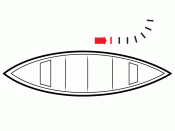Mental illnesses are common between humans, however the disease that causes permanent neurological damage, complications, and death is called stroke. People around the world suffer from this horrible disease, and it is important to recognize the victims. Despite previous beliefs that only old people are susceptible to strokes, a stroke can happen to a person of any race, sex, or age. The Physical and Mental Issues in Aging Sourcebook defines a stroke as "when blood circulation to the brain fails." (Swanson 101). Without blood, the brain cannot function, so when a stroke takes place, a clot blocks the blood flow to the brain causing the problem. A stroke can happen in the right or left hemisphere of the brain and has different effects on the person based on where it takes place. In order to understand the disease, people need to know the two different types of strokes, steps to recover from the disease and how strokes affect victims.
Two kinds of strokes are differentiated in the medical field. An ischemic stroke is a blockage of blood in the brain or neck. According to "Stroke types: Hemorrhagic versus Ischemic," "In most ischemic strokes a blood clot finishes the job by totally obstructing the flow of blood through the vessel. When a blood clot forms somewhere else (for instance, in the heart) and then travels through the blood stream until it lodges in a blood vessel, it is called an embolus, and the result is an embolic stroke" (Nutrition Health Review). Also, according to Swanson, "An ischemic stroke is responsible for about 80 percent of all strokes" (101). Ischemic strokes are the third leading killer in the United States. Each year more than 500,000 Americans have this kind of stroke, and 145,000 die from it. Living with Stroke lists some of...


